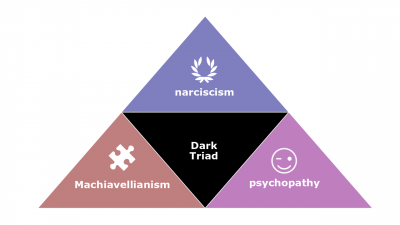Difference between revisions of "Dark Triad"
(Created page with "400px|thumb|right|[[Dark Triad]]Dark Triad (hereinafter, the ''Triad'') is a constellation of negative personality traits consisting of Machiavel...") |
(→Related coursework) |
||
| (One intermediate revision by the same user not shown) | |||
| Line 1: | Line 1: | ||
[[File:Dark-triad.png|400px|thumb|right|[[Dark Triad]]]][[Dark Triad]] (hereinafter, the ''Triad'') is a constellation of negative personality traits consisting of [[Machiavellianism]], [[narcissism]], and [[psychopathy]]. | [[File:Dark-triad.png|400px|thumb|right|[[Dark Triad]]]][[Dark Triad]] (hereinafter, the ''Triad'') is a constellation of negative personality traits consisting of [[Machiavellianism]], [[narcissism]], and [[psychopathy]]. | ||
| + | ==Definitions== | ||
| + | According to [[Organizational Behavior by Robbins and Judge (17th edition)]], | ||
| + | :[[Dark Triad]]. A constellation of negative personality traits consisting of [[Machiavellianism]], [[narcissism]], and [[psychopathy]]. | ||
==Components== | ==Components== | ||
| Line 7: | Line 10: | ||
*[[Machiavellianism]]. The degree to which an individual is pragmatic, maintains emotional distance, and believes that ends can justify means. | *[[Machiavellianism]]. The degree to which an individual is pragmatic, maintains emotional distance, and believes that ends can justify means. | ||
| − | ==Related | + | ==Related lectures== |
*[[Human Perceptions Quarter]]. | *[[Human Perceptions Quarter]]. | ||
[[Category: Septem Artes Administrativi]][[Category: Articles]] | [[Category: Septem Artes Administrativi]][[Category: Articles]] | ||
Latest revision as of 13:18, 4 January 2019
Dark Triad (hereinafter, the Triad) is a constellation of negative personality traits consisting of Machiavellianism, narcissism, and psychopathy.
Definitions
According to Organizational Behavior by Robbins and Judge (17th edition),
- Dark Triad. A constellation of negative personality traits consisting of Machiavellianism, narcissism, and psychopathy.
Components
- Narcissism. The tendency to be arrogant, have a grandiose sense of self-importance, require excessive admiration, and have a sense of entitlement.
- Psychopathy. The tendency for a lack of concern for others and lack of guilt or remorse when actions cause harm.
- Machiavellianism. The degree to which an individual is pragmatic, maintains emotional distance, and believes that ends can justify means.
